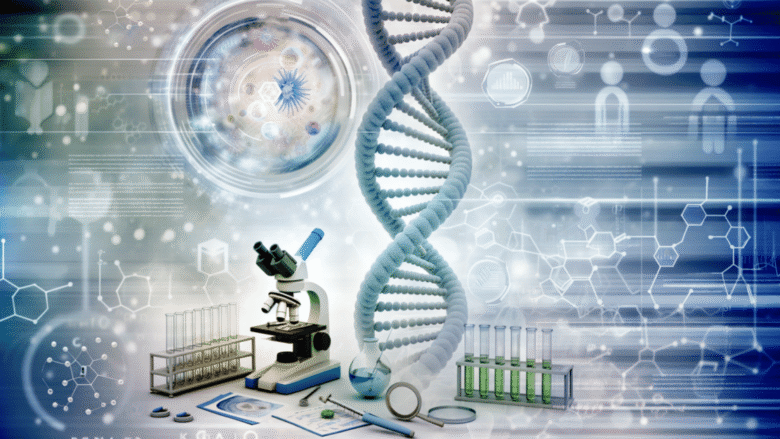Biotechnology is transforming human health by leaps and bounds. This field, once confined to science fiction, offers life-changing answers and revolutionizes medicine. We are investigating the root causes of disease, pioneering the development of personalized treatments, and harnessing the body’s complex systems to combat illness with unprecedented precision. This new era, driven by genetic engineering, artificial intelligence, and data analytics, aims to address humanity’s greatest health challenges.
A wave of technologies promises to extend lifespan and radically improve the quality of life for millions worldwide, heralding a future where incurable diseases can be cured. This article explores the science behind the key biotechnologies driving these healthcare breakthroughs and their profound impact on our future.
CRISPR and Precision Gene Editing Are Transforming Treatment:
One of the most revolutionary biotechnological innovations of the past decade—CRISPR-Cas9 gene editing—offers unprecedented precision. CRISPR, also known as “molecular scissors,” allows scientists to precisely target, cut, and alter DNA fragments, thus rewriting the code of life. This technology has expanded treatment options for hereditary diseases such as sickle cell anemia and beta thalassemia, in which mutations in a single gene lead to severe symptoms.
In clinical trials, CRISPR-edited and transfused blood cells have led to complete remissions of several diseases. In addition to single-gene disorders, researchers are also exploring the potential of CRISPR to treat complex diseases such as cancer, for example, by modifying T cells to better recognize and fight tumors and by editing genes to create natural resistance to HIV. While the ethical implications of germline editing are significant, somatic cell therapies are opening up a new medical field focused on treating genetic diseases.
The Impact of mRNA Technology on More Than Just Vaccines:
During the COVID-19 pandemic, the rapid development and deployment of mRNA vaccines demonstrated their advantages and flexibility, propelling them into mainstream use. Unlike traditional vaccinations, mRNA vaccines stimulate human cells to produce a harmless spike protein from the target virus, activating the immune system. This design and production method is faster and more adaptable to new virus variants. The success of the mRNA platform has led to an explosion of research into a wide range of diseases. Biotech companies are developing mRNA-based drugs for influenza, Zika, and HIV. Personalized mRNA cancer vaccines are being created to help the immune system identify and attack cancer cells by focusing on the specific changes in a patient’s tumor, leading to more tailored and effective treatments.
AI Accelerates Drug Discovery and Development:
The drug discovery process is lengthy, expensive, and risky. Developing a single drug takes more than a decade and costs billions of dollars. Artificial intelligence is transforming the drug discovery sector with its astonishing speed and predictive power. AI algorithms, especially machine learning and deep learning models, can quickly analyze large amounts of genetic, proteomic, and pharmacological data to find promising drug ideas faster and cheaper than ever before.
T These methods can predict how chemicals will interact with biological targets, thereby reducing the risks associated with early-stage research. Beyond drug development, AI can enhance clinical trials by identifying suitable patient populations and predicting potential side effects, which increases efficiency and success rates. AI also helps companies discover new uses for old drugs and accelerates their time to market. The integration of biotechnology and computer science creates more efficient, data-driven pathways for new drug development.
Evolving Telemedicine and Digital Health Platforms:
Telemedicine and digital health platforms represent a crucial fusion of biotechnology and digital technologies, transforming patient care. These systems enable remote consultations, wearable health monitoring, and real-world data-driven health insights. For the future of biotechnology, this digital infrastructure is crucial for collecting comprehensive longitudinal statistical data for research and patient care related to innovative therapies, such as AI-driven gene and cell therapies, which require close monitoring.
Wearable devices can measure heart rate, blood sugar, sleep, and activity, providing biomarker data that enables more proactive and preventive care. Digital monitoring and advanced biotherapies enable more personalized treatment plans and timely interventions, creating a holistic health ecosystem that empowers patients and improves outcomes outside the clinic.
Microbiome Therapies: Treating Disease with Beneficial Bacteria
The human microbiome—a vast ecosystem of trillions of bacteria, viruses, and fungi found in and on the human body, particularly the gut—is now recognized as a key driver of health and disease. Biotech companies are harnessing this complex internal world to develop microbiome-based medicines. Scientists hope to treat a staggering number of diseases by carefully manipulating these microbial ecosystems. Fecal microbial transplants (FMTs) have proven effective in treating recurrent Clostridium difficile infections, fueling the development of standardized, purified microbiota.
Microbiome-based therapies for inflammatory bowel disease (IBD), irritable bowel syndrome (IBS), allergies, metabolic disorders, and even neurological disorders such as Parkinson’s disease and depression are being actively explored through the brain-gut axis. From specialized probiotic strains and prebiotics to engineered microbial communities with specific therapeutic functions, these tools represent a paradigm shift in harnessing the body’s natural biomimetic potential to restore health.
Liquid Biopsies for Advanced Diagnostics:
Early detection is essential for cancer treatment, but many diagnostic procedures are invasive, expensive, or insensitive. Liquid biopsies are revolutionizing diagnostics and addressing these challenges. This minimally invasive approach allows for the detection of tumor markers such as circulating tumor DNA (ctDNA) or cancer cells with a simple blood draw. Unlike tissue samples that require surgery, liquid biopsies can quickly and efficiently reveal genetic information about a disease.
Oncologists can dynamically adjust treatment plans by detecting cancer earlier, immediately assessing treatment response, and identifying emerging resistance mutations. This approach is also used to identify genetic abnormalities in prenatal testing and to monitor organ transplant rejection without invasive procedures. As sequencing technology becomes more sensitive, precision medicine will rely on liquid biopsies, enabling proactive and personalized disease care.
Conclusion:
Advances in biotechnology are ushering in a golden age of medical science, redefining what is treatable and curable. From the precision of CRISPR editing and the versatility of mRNA to the predictive power of artificial intelligence and new insights into the microbiome, these developments are revolutionizing the treatment of health and disease. They herald a future in which treatments are personalized, preventative, and precisely tailored to the genetic and biological characteristics of each individual. Despite challenges related to accessibility, ethics, and economics, biotechnology enables us not only to manage disease but also to defeat it. These healthcare breakthroughs offer hope and healing to millions of people and set new standards for health and longevity for future generations.
FAQs:
1. What is the most significant breakthrough in biotechnology today?
The successful application of mRNA technology in COVID-19 vaccines and its rapid development into cancer immunotherapy and infectious diseases is one of the most important and proven achievements to date. A versatile, swift, and powerful medical platform has been validated.
2. Is CRISPR gene therapy safe for humans?
In clinical trials, CRISPR-based drugs that modify somatic cells (non-germline cells) have demonstrated an encouraging safety profile. However, concerns remain about off-target effects (editing the wrong gene) and their long-term consequences. Before they can be used on a large scale, rigorous clinical trials and continuous monitoring are needed to ensure safety and efficacy.
3. How does artificial intelligence (AI) discover drugs?
AI algorithms learn from reliable datasets of chemical structures, biological interactions, and pharmacology. They can detect patterns that people might overlook, allowing them to predict how a new molecule will behave in the body, which proteins it will bind to, and whether it can treat a disease.
4. What are the advantages of liquid biopsies over standard biopsies?
A blood test, called a liquid biopsy, can reveal cancer biomarkers such as ctDNA. It is less invasive and more repeatable than a surgical tissue biopsy and can reveal the complete tumor profile. This allows for more accurate monitoring and earlier detection of changes.
5. Are these advanced biotechnological drugs affordable?
This is a major challenge. The development and production of these drugs is complex and expensive. Their initial price tag is high. However, as technology advances and manufacturing processes improve, costs should decrease. Healthcare systems and insurance companies are developing new payment methods to ensure patients have access to these drugs.



